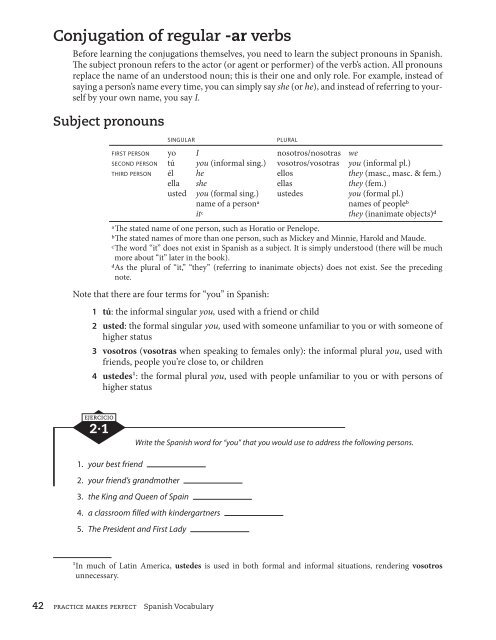- Page 2 and 3:
PRACTICE MAKES PERFECT Spanish Voca
- Page 4 and 5:
Preface ix Acknowledgments xi Preli
- Page 6 and 7: 4 Irregular verbs 93 Jugar (to play
- Page 8 and 9: 8 Refl exive verbs 265 Refl exive v
- Page 10 and 11: Preface Language, like all forms of
- Page 12 and 13: Acknowledgments Many exceptional pe
- Page 14 and 15: This page intentionally left blank
- Page 16 and 17: stage, it’s a good idea to leave
- Page 18 and 19: Heteronyms don’t exist in Spanish
- Page 20 and 21: 6. la cruz (cross) 7. el reloj (clo
- Page 22 and 23: Cognates ◆ Quotation marks, used
- Page 24 and 25: To start you of , a list of common
- Page 26 and 27: Basic greetings Listed below are se
- Page 28 and 29: VOCABULARIO Los meses del año (The
- Page 30 and 31: Beginning with 20, the numbers foll
- Page 32 and 33: ·1· The basics 18 Grammar Dei nit
- Page 34 and 35: VOCABULARIO La familia y los amigos
- Page 36 and 37: Indefi nite articles Indei nite art
- Page 38 and 39: EJERCICIO 1·5 24 practice makes pe
- Page 40 and 41: VOCABULARIO Unas palabras básicas
- Page 42 and 43: Está, the “is” of location VOC
- Page 44 and 45: EJERCICIO 1·11 1. My skunk is in t
- Page 46 and 47: � Los suministros básicos (Basic
- Page 48 and 49: Read the following story for enjoym
- Page 50 and 51: Standard orthographic changes h e w
- Page 52 and 53: 2 h e noun’s ending Spanish is ri
- Page 54 and 55: EJERCICIO 1·19 40 practice makes p
- Page 58 and 59: h e pattern for conjugating verbs i
- Page 60 and 61: VOCABULARIO Los lugares del empleo
- Page 62 and 63: EJERCICIO 2·7 48 practice makes pe
- Page 64 and 65: Conjugation of regular -er verbs No
- Page 66 and 67: � La carne de ave (Poultry) capon
- Page 68 and 69: 6. Los estudiantes de la escuela
- Page 70 and 71: Qualitative adjectives Adjectives d
- Page 72 and 73: EJERCICIO 2·18 1. the blue whale 2
- Page 74 and 75: EJERCICIO 2·19 60 practice makes p
- Page 76 and 77: VOCABULARIO Dentro de y por la escu
- Page 78 and 79: 7. Tú entras en un salón de clase
- Page 80 and 81: EJERCICIO 2·25 66 practice makes p
- Page 82 and 83: � STORE ENGLISH EQUIVALENT BASE N
- Page 84 and 85: ·3· 70 Grammar Asking questions S
- Page 86 and 87: VOCABULARIO La ropa (Items of cloth
- Page 88 and 89: Negative responses When you answer
- Page 90 and 91: 4. ¿Tienes mucho dinero en el banc
- Page 92 and 93: EJERCICIO 78 practice makes perfect
- Page 94 and 95: EJERCICIO 3·7 80 practice makes pe
- Page 96 and 97: ¿Sabes que...? ◆ La Torre de Lon
- Page 98 and 99: EJERCICIO 3·11 84 practice makes p
- Page 100 and 101: h ere are two things to remember wi
- Page 102 and 103: EJERCICIO 3·15 88 practice makes p
- Page 104 and 105: The suffi xes -ero and -era At the
- Page 106 and 107:
pero en mi mente, los enemigos real
- Page 108 and 109:
EJERCICIO 4·1 1. I give. 2. We hea
- Page 110 and 111:
� 96 practice makes perfect Spani
- Page 112 and 113:
VOCABULARIO Los asuntos de los depo
- Page 114 and 115:
The two-verb rule: poder and querer
- Page 116 and 117:
EJERCICIO 4·7 Para traducir 1. I w
- Page 118 and 119:
6. Do you [informal sing.] believe
- Page 120 and 121:
Tener que � infi nitive: the “h
- Page 122 and 123:
EJERCICIO 4·13 Para traducir 1. My
- Page 124 and 125:
Ir � a � verb: to express futur
- Page 126 and 127:
5. Clark Gable plays the role of Rh
- Page 128 and 129:
EJERCICIO 4·18 114 practice makes
- Page 130 and 131:
13. She hears. 17. You all hear. 14
- Page 132 and 133:
VOCABULARIO Clases de libros y cosa
- Page 134 and 135:
La Odisea también tiene veinticuat
- Page 136 and 137:
The personal a Every language has i
- Page 138 and 139:
EJERCICIO 4·27 1. Visitamos la act
- Page 140 and 141:
� movie/i lm director el director
- Page 142 and 143:
8. The truck driver sees every part
- Page 144 and 145:
5. The bathroom smells terrible! Yo
- Page 146 and 147:
h e indirect object pronoun can go
- Page 148 and 149:
You have been exposed to many of th
- Page 150 and 151:
EJERCICIO 4·35 136 practice makes
- Page 152 and 153:
cristalería americana Steuben con
- Page 154 and 155:
Because ser and estar are rich in c
- Page 156 and 157:
4. Today is Thursday. 5. Chris Rock
- Page 158 and 159:
EJERCICIO 5·3 1. I am proud of Gar
- Page 160 and 161:
146 practice makes perfect Spanish
- Page 162 and 163:
Current action: the present progres
- Page 164 and 165:
EJERCICIO 5·9 150 practice makes p
- Page 166 and 167:
EJERCICIO 5·11 Para traducir 1. Wh
- Page 168 and 169:
Deviation from the norm, unnatural
- Page 170 and 171:
5. These peas aren’t round (redon
- Page 172 and 173:
EJERCICIO 5·17 1. I am in the car.
- Page 174 and 175:
The rest of the clock To tell time
- Page 176 and 177:
5. Normalmente, ¿a qué hora haces
- Page 178 and 179:
9. If you arrive late, you can’t
- Page 180 and 181:
EJERCICIO 5·24 Para traducir 1. I
- Page 182 and 183:
VOCABULARIO Las fechas signifi cant
- Page 184 and 185:
Possessive pronouns Possession What
- Page 186 and 187:
EJERCICIO 5·28 172 practice makes
- Page 188 and 189:
� Los adjetivos (Adjectives) betr
- Page 190 and 191:
EJERCICIO 5·30 estar Goofus está
- Page 192 and 193:
EJERCICIO 5·31 178 practice makes
- Page 194 and 195:
Since we’re studying comparisons,
- Page 196 and 197:
note When referring to something in
- Page 198 and 199:
EJERCICIO 5·35 1. This is a hat. 2
- Page 200 and 201:
5. These are ridiculous. 6. These a
- Page 202 and 203:
-és/-esa (frequent English counter
- Page 204 and 205:
6. El peor equipo de béisbol profe
- Page 206 and 207:
In this unit, we will consider the
- Page 208 and 209:
7. Do (all of) you [informal] know
- Page 210 and 211:
EJERCICIO 6·3 196 practice makes p
- Page 212 and 213:
EJERCICIO 6·4 198 practice makes p
- Page 214 and 215:
200 practice makes perfect Spanish
- Page 216 and 217:
202 practice makes perfect Spanish
- Page 218 and 219:
EJERCICIO 204 practice makes perfec
- Page 220 and 221:
6. Every culture has obscene gestur
- Page 222 and 223:
6. ¿Qué movimiento de arte repres
- Page 224 and 225:
perio del maquillaje). También él
- Page 226 and 227:
� Los verbos (Verbs) to be on tou
- Page 228 and 229:
Story. En total, compongo tres sinf
- Page 230 and 231:
¿Sabes que...? ◆ El dramaturgo E
- Page 232 and 233:
4. The mime asks me for directions
- Page 234 and 235:
EJERCICIO 6·15 ¿Verdadero o falso
- Page 236 and 237:
VOCABULARIO Las comunicaciones (Com
- Page 238 and 239:
Completar, terminar, cumplir, acaba
- Page 240 and 241:
EJERCICIO 6·20 ¿Verdadero o falso
- Page 242 and 243:
EJERCICIO 6·21 ¿Verdadero o falso
- Page 244 and 245:
Four very common adverbs that do no
- Page 246 and 247:
EJERCICIO 6·22 COMPOUND NOUN SPANI
- Page 248 and 249:
·7· Stem-changing verbs 234 Gramm
- Page 250 and 251:
EJERCICIO 7·1 dormir to sleep enco
- Page 252 and 253:
EJERCICIO 7·3 ¿Verdadero o falso?
- Page 254 and 255:
240 practice makes perfect Spanish
- Page 256 and 257:
EJERCICIO 7·5 ¿A o B? 1. El peri
- Page 258 and 259:
EJERCICIO 7·7 ¿Verdadero o falso?
- Page 260 and 261:
246 practice makes perfect Spanish
- Page 262 and 263:
EJERCICIO 7·9 Favor de conjugar 1.
- Page 264 and 265:
EJERCICIO 7·11 Para traducir 1. If
- Page 266 and 267:
The suffi x -ismo h e sui x -ismo i
- Page 268 and 269:
� Los verbos (Verbs) to be broke
- Page 270 and 271:
Weights and measures Pesar In this
- Page 272 and 273:
VOCABULARIO El peso, la densidad y
- Page 274 and 275:
3. What size is your shoe? It’s s
- Page 276 and 277:
EJERCICIO 7·19 262 practice makes
- Page 278 and 279:
EJERCICIO 7·21 FORMED WORD ENGLISH
- Page 280 and 281:
Any of the common rel exive verbs l
- Page 282 and 283:
EJERCICIO 8·2 ¿Verdadero o falso?
- Page 284 and 285:
� Los verbos (Verbs) to beat (hea
- Page 286 and 287:
� junkie el/la yonqui, el/la toxi
- Page 288 and 289:
Ponerse, hacerse, volverse a, conve
- Page 290 and 291:
� community la comunidad confessi
- Page 292 and 293:
7. Timoteo es el Obispo de Ephesus
- Page 294 and 295:
EJERCICIO 8·10 ¿Verdadero o falso
- Page 296 and 297:
8. Durante el último día, hay dos
- Page 298 and 299:
Una persona no puede discutir los c
- Page 300 and 301:
� Los adjetivos y las expresiones
- Page 302 and 303:
Gustar h e verb gustar means “to
- Page 304 and 305:
Finally, use gustar to tell the thi
- Page 306 and 307:
EJERCICIO 8·18 ¿Verdadero o falso
- Page 308 and 309:
EJERCICIO 8·20 1. I have a toothac
- Page 310 and 311:
� Los adjetivos (Adjectives) achi
- Page 312 and 313:
EJERCICIO 8·22 ¿Verdadero o falso
- Page 314 and 315:
� Los adjetivos (Adjectives) al i
- Page 316 and 317:
EJERCICIO 8·24 302 practice makes
- Page 318 and 319:
VOCABULARIO En la ofi cina del ópt
- Page 320 and 321:
EJERCICIO 8·26 ¿Quién soy? 1. So
- Page 322 and 323:
In this unit’s world of new vocab
- Page 324 and 325:
� Los verbos (Verbs) to accelerat
- Page 326 and 327:
VOCABULARIO Viajar por carretera (R
- Page 328 and 329:
� Los adjetivos (Adjectives) auto
- Page 330 and 331:
VOCABULARIO Viajar por avión (Trav
- Page 332 and 333:
VOCABULARIO Viajar por ferrocarril
- Page 334 and 335:
VOCABULARIO Viajar por barco (Trave
- Page 336 and 337:
322 practice makes perfect Spanish
- Page 338 and 339:
Por EJERCICIO 9·8 ¿Verdadero o fa
- Page 340 and 341:
� Los verbos (Verbs) to camp acam
- Page 342 and 343:
� privacy la privacidad, la intim
- Page 344 and 345:
VOCABULARIO El lenguaje (Language)
- Page 346 and 347:
Motivation or reason for doing some
- Page 348 and 349:
honoraria de Los Estados Unidos, ot
- Page 350 and 351:
� Los verbos (Verbs) to correspon
- Page 352 and 353:
4. ¿Qué tienes en la mano mí? 5.
- Page 354 and 355:
7. In order to assess your progress
- Page 356 and 357:
� dune la duna earthquake el terr
- Page 358 and 359:
VOCABULARIO La atmósfera y el ecos
- Page 360 and 361:
EJERCICIO 9·19 ¿A, B o C? 1. Vas
- Page 362 and 363:
VOCABULARIO La guerra y la paz (War
- Page 364 and 365:
EJERCICIO 9·21 350 practice makes
- Page 366 and 367:
EJERCICIO 9·22 ¿Cuál es la respu
- Page 368 and 369:
5. George S. Patton, Napoleón, Cha
- Page 370 and 371:
·10· 356 The passive voice and ne
- Page 372 and 373:
EJERCICIO 10·1 ¿Verdadero o falso
- Page 374 and 375:
� Los verbos (Verbs) to arrest ar
- Page 376 and 377:
VOCABULARIO El juicio y la sentenci
- Page 378 and 379:
EJERCICIO 10·3 ¿Verdadero o falso
- Page 380 and 381:
Negatives When your grammar teacher
- Page 382 and 383:
EJERCICIO 10·5 1. I don’t have a
- Page 384 and 385:
EJERCICIO 10·6 ¿Verdadero o falso
- Page 386 and 387:
VOCABULARIO En la ofi cina (In the
- Page 388 and 389:
VOCABULARIO En la fábrica (In the
- Page 390 and 391:
VOCABULARIO En el cobertizo para he
- Page 392 and 393:
VOCABULARIO Los negocios (Business)
- Page 394 and 395:
VOCABULARIO La banca y la economía
- Page 396 and 397:
EJERCICIO 10·12 Para traducir 1. I
- Page 398 and 399:
Escorpio de 24 octubre-22 noviembre
- Page 400 and 401:
� Unas frases selectivas (A few c
- Page 402 and 403:
EJERCICIO 10·15 388 practice makes
- Page 404 and 405:
P·4 1. J 6. A 2. H 7. F 3. I 8. E
- Page 406 and 407:
1·4 1. el chico 2. un chico 3. los
- Page 408 and 409:
1·15 1. Se llama Eeyore. 2. Se lla
- Page 410 and 411:
2·6 1. Albert Einstein 2. Russell
- Page 412 and 413:
2·21 1. a 5. a 2. c 6. c 3. b 7. a
- Page 414 and 415:
3·6 1. C 6. B 2. F 7. A 3. H 8. I
- Page 416 and 417:
3·18 1. la zapatera 2. la jugueter
- Page 418 and 419:
4·10 1. V 6. F 2. F 7. V 3. F 8. V
- Page 420 and 421:
4·21 1. Te veo. 2. Me ves. 3. Ella
- Page 422 and 423:
4·32 1. Él me da el libro. 2. Le
- Page 424 and 425:
5·11 1. Cuando mi comida está moh
- Page 426 and 427:
5·23 1. lunes/martes/miércoles/ju
- Page 428 and 429:
5·35 1. Éste es un sombrero. 2.
- Page 430 and 431:
6·7 1. Conozco muchas obras de art
- Page 432 and 433:
6·21 1. V 6. F 2. F 7. V 3. F 8. V
- Page 434 and 435:
7·9 1. frío 2. impides 3. gime 4.
- Page 436 and 437:
7·20 1. en el tubo 2. en la caja 3
- Page 438 and 439:
8·12 1. V 6. V 2. V 7. V 3. F 8. F
- Page 440 and 441:
8·26 1. Hipócrates 2. Dr. Christi
- Page 442 and 443:
9·14 1. b 5. c 2. d 6. a 3. c 7. b
- Page 444 and 445:
10·3 1. F 6. F 2. V 7. V 3. F 8. V
- Page 446 and 447:
10·15 1. Truman Capote 2. Oprah Wi
- Page 448 and 449:
death, 237 decir,131 dei nite artic
- Page 450:
ser conjugation, 152 and estar, 139

















